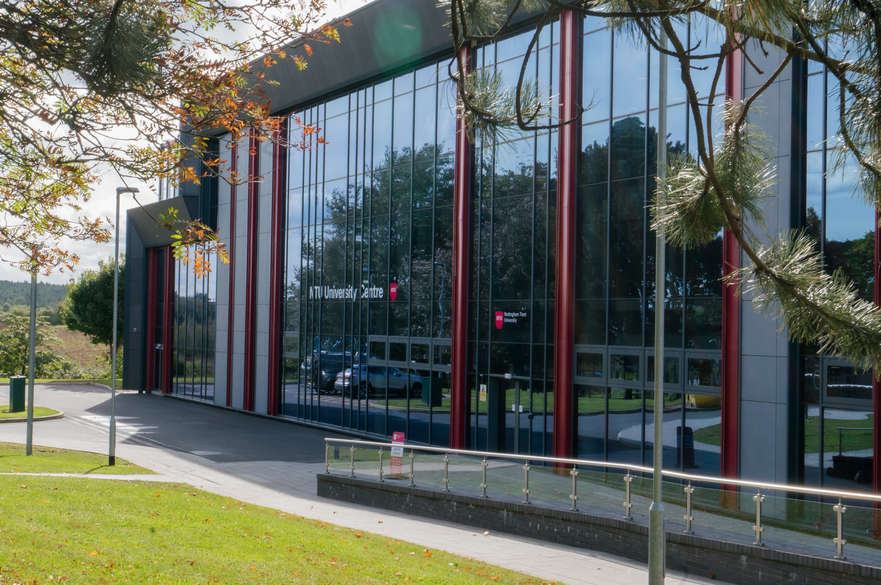This course is in Clearing
Offers from 48 tariff points
About this course
Are you ready to shape the future of education? The Foundation degree in Education course covers how people learn and develop throughout their lives – enabling you to make a difference to learners of all ages.
Taught at NTU in Mansfield, you’ll get to grips with a range of social, cultural, and political aspects of education. You’ll explore the meaning of education, who it’s for and whether it’s socially just. With a focus on real-world learning, you’ll also consider education in its broadest sense at local, national and international level.
Whether you plan to go straight into the world of work on completing your foundation degree, or this is your stepping stone to further study, you’ll gain the knowledge and transferable skills you need to progress in a diverse range of careers in education.
-
The course includes a placement alongside your studies in an educational setting, giving you hands-on experience and the confidence to become an effective practitioner.
-
On completing the course, you will be eligible to top-up to degree-level study with the BA (Hons) Education and Professional Practice (Top-up).
-
On completing this foundation degree, you’ll be well-placed to go straight into the world of work and take up a variety of careers within education.
-
The course is delivered over 2-3 days a week, allowing you to fit in study around other commitments.
What you’ll study
In the first year, you’ll shadow professionals and visit educational settings. You’ll begin to explore and debate different educational contexts and approaches. Additionally, you’ll start developing their teaching, learning, and assessment skills using both theory and your own experiences.
In the second year, you’ll have a substantial placement in an educational setting. This hands-on experience will be used throughout the year to analyse how teaching theory and educational policy influence teaching and learning.
Academic Skills Development (20 credit points)
- This module supports you in your transition into Higher Education and in understanding what is expected at this level of study and beyond.
- You’ll gain the essential skills needed to be successful in your academic journey.
Making Learning Inclusive (20 credit points)
- This module introduces you to the key concepts and issues around inclusion, including changing attitudes and approaches to supporting learners with diverse needs.
- You’ll gain insight into differing perspectives on inclusion and how they have shaped educational practices and provisions for learners with special educational needs and disabilities.
Key Questions in Education (20 credit points)
- This module develops your understanding of what education is by engaging in debates about its aims, purposes, and various types, from formal settings (e.g., schools, colleges) to alternative and informal contexts (e.g., museums, Forest Schools, community learning).
- You’ll explore philosophical and sociological concepts in education and their influence on contemporary educational practices and settings in the UK.
Educational Contexts (20 credit points)
- This module will introduce you to various educational contexts and pedagogies, exploring diverse approaches to educating young people.
- You’ll cover philosophical foundations behind these approaches and their significance in specific educational settings.
Introduction to Teaching (20 credit points)
- This module introduces you to the processes associated with lesson planning.
- You’ll explore teaching practices, from teacher-centred to student-centred approaches, and the roles of teachers and students in learning.
- You’ll cover experiential learning models and how teaching is shaped by legislation and research.
Outdoor Learning (20 credit points)
- This module focusses on reflective practice and theory.
- You’ll be encouraged to employ critical reflection to explore your own practice and how this shapes your leaderful approach to early childhood care and education.
Professional Practice placement (40 credit points)
- As part of this module, you’ll develop your personal and professional skills in a placement setting.
Education Policy and Practice (20 credit points)
- This module explores how educational policies shape systems and practices, focusing on the ideologies that have influenced the British education system.
- You’ll analyse the impact of these policies on learning, educational settings, communities, and employers, and debate their influence on educational practices.
Special Educational Needs and Disabilities (20 credit points)
- This module covers what we mean by Special Educational Needs and Disability (SEND).
- You’ll broaden your understanding of current issues from a National, Local Government, professional and young person’s perspectives.
- You’ll develop your knowledge and skills of a range of strategies to support learners in several educational contexts.
Researching Learning (20 credit points)
- This module covers how to research within education and develop the skills to design and justify a research project.
- You’ll explore the theoretical foundations of research, including different approaches and methods.
Educator Identity (20 credit points)
- This module examines identity as an evolving process, influenced by both external factors and personal negotiation. It explores how individuals shape their identities in daily life.
- You’ll also look at barriers in education related to social class, gender, race, and sexuality, focusing on the power dynamics that limit opportunities.
We regularly review and update our course content based on student and employer feedback, ensuring that all of our courses remain current and relevant. This may result in changes to module content or module availability in future years.
Don’t just take our word for it, hear from our students themselves
Careers and employability
Your future career
With an FdA in Education, you will be eligible to apply to study BA (Hons) Education and Professional Practice (Top-up).
Graduates from this course are well-placed to take up a variety of careers within education and students can go straight into work after their foundation degree.
With an FdA in Education you can start your career path towards roles such as:
- Teaching Assistant
- Early Year Educator
- Childminder
- Primary Teacher
- Nursery Teacher.
Employability Team
At NTU in Mansfield, our award-winning Employability team is here to inspire and enhance your career planning, whichever path you choose. Whether you wish to go on to further study or to look for job opportunities, we can guide you to be a successful candidate.
Campus and facilities
You’ll mainly be studying in the Mansfield Hub's University Centre, with access to facilities including dedicated study zones, sports facilities and social spaces.
Mansfield offers a great (and very affordable) social scene. If you’re not already familiar with the region, Nottingham — one of Britain’s top 10 student cities, and one of Europe’s top 25 — is also just a 30-minute bus ride away. You’ll find a city stuffed with history, culture, and well-kept secrets to discover at your leisure: enjoy lush green spaces, galleries, hidden cinemas and vintage shopping by day, and an acclaimed food, drink and social scene by night.
Take our virtual tour to get a real feel for the campus.
Entry requirements
This course is in Clearing
Looking for a place in Clearing? We are accepting application and would love to hear from you!
UK students
This course is in Clearing
Looking for a place in Clearing? We are accepting applications and would love to hear from you!
Clearing requirements
From 48 UCAS tariff points from up to 3 qualifications.
To discuss our entry requirements and see what we can offer you, call us now on +44 (0)115 848 6000. Alternatively, if you already have your qualifications, apply online via our Clearing Application form.
Preparing for results day? Beat the queue and sign up for NTU Priority for up-to-date information about all things Clearing. You’ll get an offer ahead of Clearing, subject to you achieving the required grades on results day.
Additional requirements for UK students
An Enhanced with Barred List(s) DBS check; and a satisfactory placement suitability check.
Meeting our entry requirements
Hundreds of qualifications in the UK have UCAS Tariff points attached to specific grades, including A-levels, BTECs, T Levels and many more. You can use your grades and points from up to three different qualifications to meet our criteria. Enter your predicted or achieved grades into our Tariff calculator to find out how many points your qualifications are worth.
Other qualifications and experience
NTU welcomes applications from students with non-standard qualifications and learning backgrounds, either for year one entry or for advanced standing beyond the start of a course into year 2 or beyond.
We consider study and/or credit achieved from a similar course at another institution (otherwise known as credit transfer), vocational and professional qualifications, and broader work or life experience.
Our Recognition of Prior Learning and Credit Transfer Policy outlines the process and options available for this route. If you wish to apply via Recognition of Prior Learning, please contact the central Admissions and Enquiries Team who will be able to support you through the process.
Getting in touch
If you need more help or information, get in touch through our enquiry form.
International students
This course is in Clearing
Looking for a place in Clearing? We are accepting applications and would love to hear from you!
Clearing requirements
From 48 UCAS tariff points from up to 3 qualifications.
To discuss our entry requirements and see what we can offer you, call us now on +44 (0)115 848 6000. Alternatively, if you already have your qualifications, apply online via our Clearing Application form.
Preparing for results day? Beat the queue and sign up for NTU Priority for up-to-date information about all things Clearing. You’ll get an offer ahead of Clearing, subject to you achieving the required grades on results day.
This course is not suitable for tier 4 visa applicants.
Additional requirements for international students
There are no additional requirements for this course.
English language requirements
View our English language requirements for all courses, including alternative English language tests and country qualifications accepted by the University.
If you need help achieving the language requirements, we offer a Pre-Sessional English for Academic Purposes course on our City campus which is an intensive preparation course for academic study at NTU.
Other qualifications and experience
If you have the right level of qualifications, you may be able to start your Bachelors degree at NTU in year 2 or year 3. This is called ‘advanced standing’ entry and is decided on a case-by case basis after our assessment of your qualifications and experience.
You can view our Recognition of Prior Learning and Credit Transfer Policy which outlines the process and options available, such as recognising experiential learning and credit transfer.
Sign up for emails
Sign up to receive regular emails from the International Office. You'll hear about our news, scholarships and any upcoming events in your country with our expert regional teams.
Getting in touch
If you need advice about studying at NTU as an international student or how to apply, our international webpages are a great place to start. If you have any questions about your study options, your international qualifications, experience, grades or other results, please get in touch through our enquiry form. Our international teams are highly experienced in answering queries from students all over the world.
Policies
We strive to make our admissions procedures as fair and clear as possible. To find out more about how we make offers, visit our admissions policies page.








